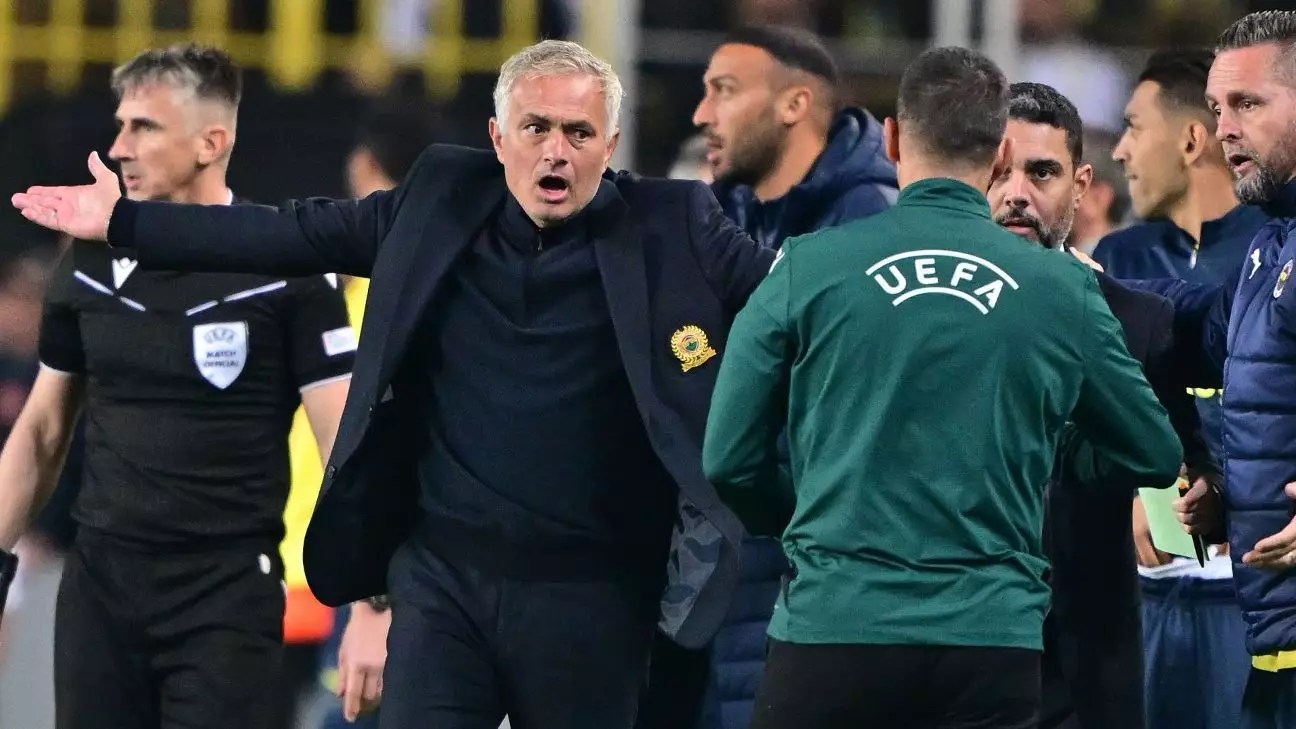Jose Mourinho, a name synonymous with high-stakes football and polarizing management styles, has found himself embroiled in controversy following his experiences in European competitions. His recent comments reveal a growing dissatisfaction with the treatment he believes he has received from UEFA, particularly after the emotional fallout of the 2023 Europa League final, where his AS Roma squad suffered a heartbreaking defeat to Sevilla. The ramifications of that match and the subsequent disciplinary measures he faced have left Mourinho feeling increasingly isolated within the European football landscape.
Mourinho’s tenure as Roma’s coach was marked by the challenges of competing at the highest level, and the 2023 Europa League final epitomized the pressures inherent in such competitions. Following the match, which ended in a penalty shootout defeat, Mourinho found himself subjected to a four-match touchline ban due to his contentious remarks directed at referee Anthony Taylor. In an interview with Sky Sports, he expressed his frustration, stating, “The feeling is, I am in trouble in Europe.” Such comments reflect a sense of victimization that Mourinho associates with his persistent run-ins with UEFA’s regulatory framework.
Mourinho’s deep-seated resentment stems not only from the loss but from what he perceives as an imbalanced approach to discipline within European football. He has asserted that he does not seek preferential treatment but rather consistent and fair application of rules: “If I do something wrong, punish and pay… But if I do nothing wrong, leave me in peace.” This plea for equanimity invites scrutiny into the dynamics of power and accountability among football managers, exemplifying the broader tensions that exist within elite competitions.
Just days after voicing his discontent, Mourinho faced further frustration on the pitch during a Europa League match against Manchester United. A contentious decision by the referee led to his expulsion from the game, prompting Mourinho to again lament the scrutiny and judgment he routinely faces. “I deserve to be [treated] like everybody else,” he declared, calling for an equitable application of conduct standards regardless of a coach’s stature in the game. This assertion resonates with many who believe that the pressures of high-level coaching should result in an equivalent expectation of conduct for all, regardless of their past accolades.
Mourinho’s desire for fairness raises crucial questions about the nuances of accountability in football. Are managers held to different standards based on their historical reputation and previous successes? Mourinho’s comments suggest that he feels unfairly targeted, potentially reflecting a broader sentiment among coaches that football authorities are inconsistent in their enforcement of disciplinary measures.
Despite the turbulence of recent events, Mourinho’s career remains a subject of eager speculation. After the draw with United, he hinted at a future away from UEFA competitions, suggesting that should he take another coaching position in England, it would not be with a relegation-threatened team. His initial comments hinted at frustration with the emotional toll of competing in high-pressure environments, where the stakes are not only trophies but the very survival of clubs.
However, it’s essential to consider the humor in Mourinho’s words; his suggestion that he wouldn’t engage in a relegation battle was later clarified as a jest. This contradiction illustrates the duality of his character: he is both a strategist with unwavering ambition and an individual recognizing the emotional strains that accompany a coaching career.
Mourinho’s longing for a return to the Premier League, where he previously built successful tenures with Chelsea and Manchester United, is nuanced by his acknowledgment of timing. He acknowledges that a return may not happen in the immediate future but expresses a desire for a revival of his career in England, stating, “London is home, so one day I have to be back.” This longing for reconnection with the Premier League landscape underscores the inextricable ties he has forged within English football, despite the challenges he has faced.
Mourinho’s relationship with UEFA and his reflections on his coaching career are emblematic of the broader challenges faced by elite managers. His calls for fairness and consistency highlight the pressing need for transparency and accountability in football governance. As he steers towards new horizons, Mourinho remains a captivating figure—a blend of controversy, ambition, and an undying love for the game.


Leave a Reply